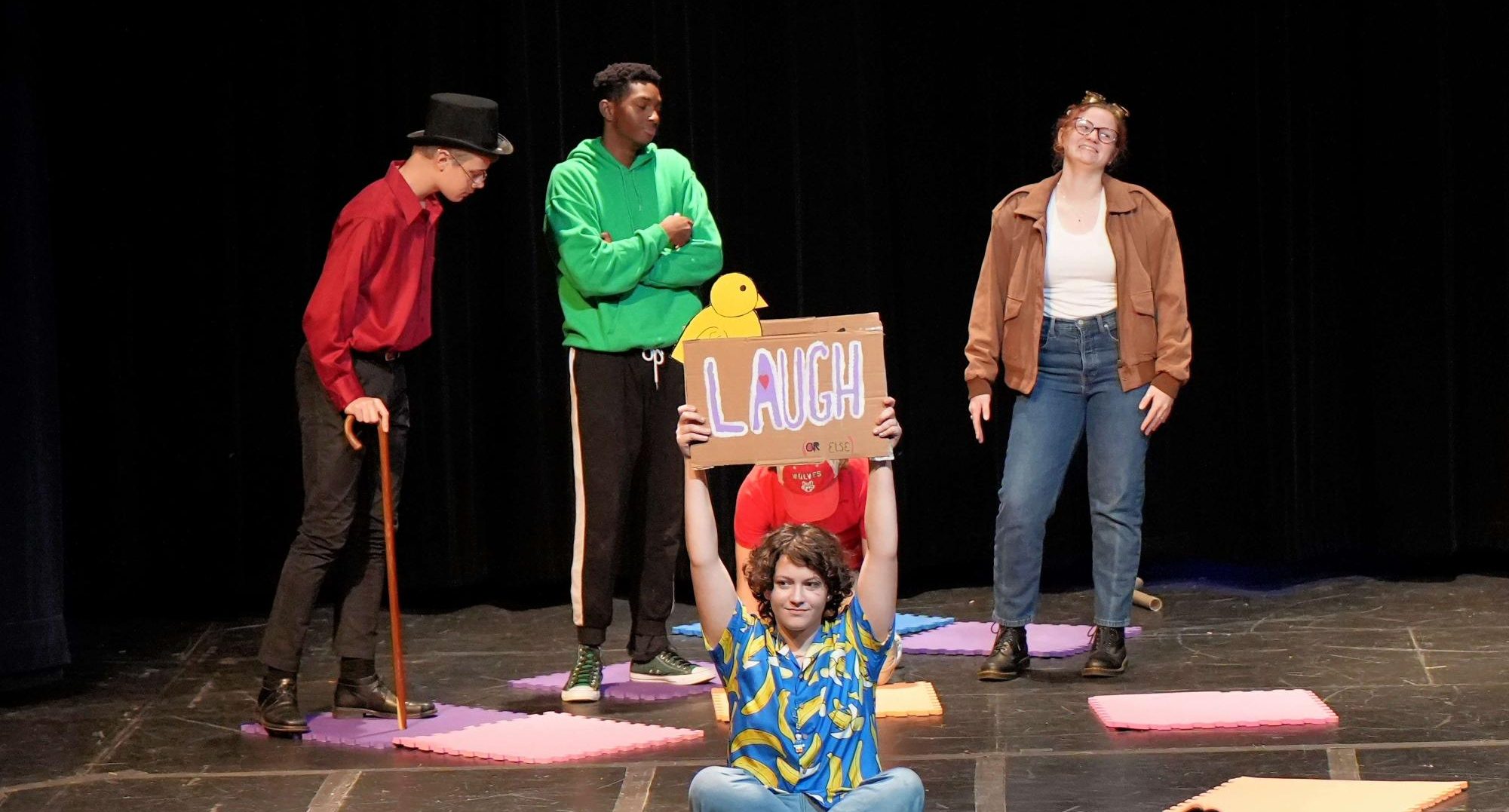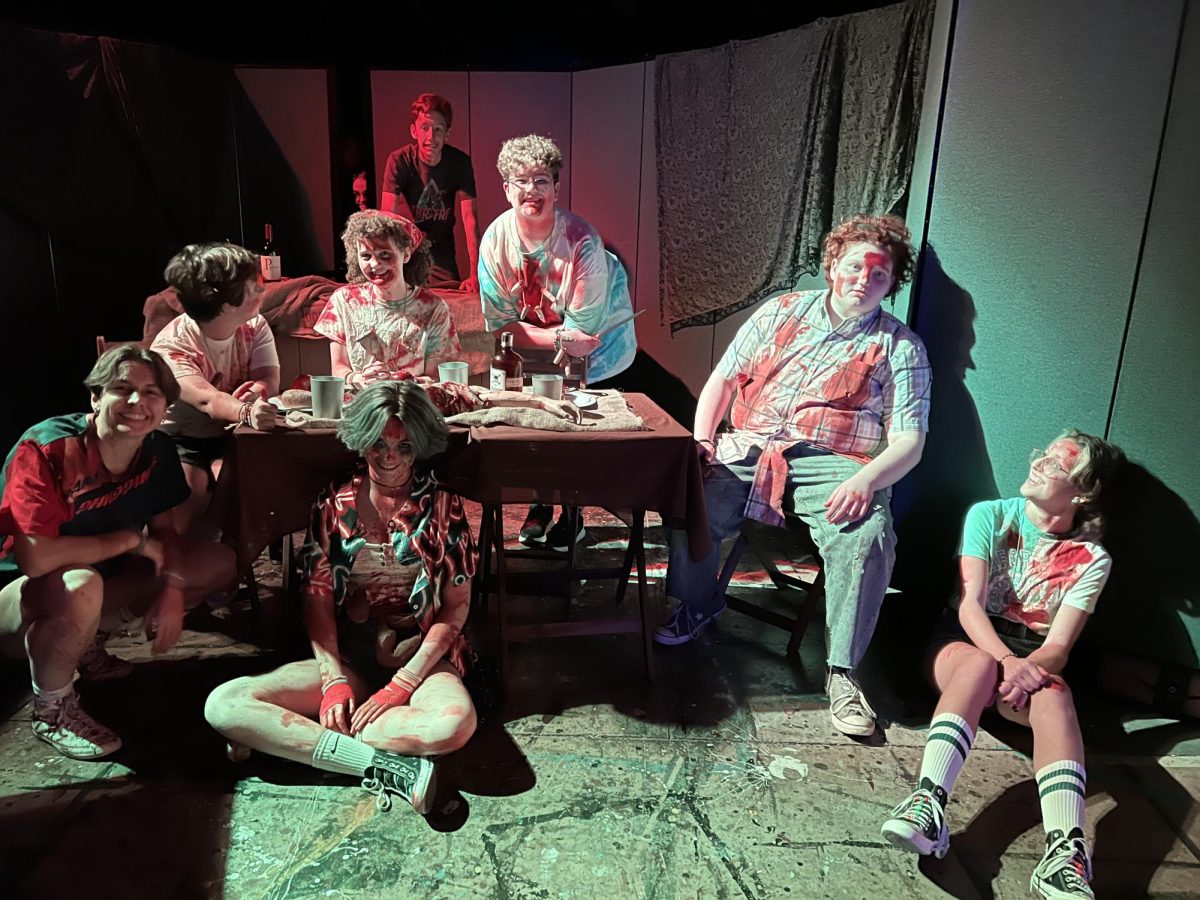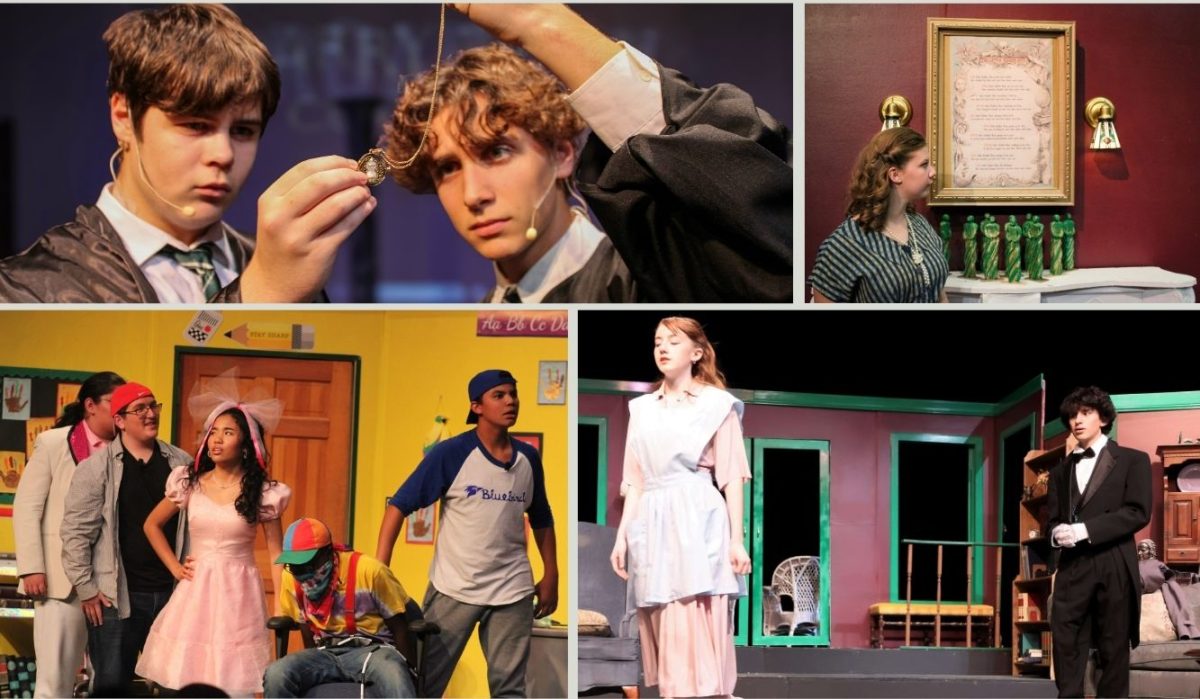In late January, Lake Park Theatre put on a series of shorter productions directed by students: Passionate Peninsula, How to Survive a Zombie Apocalypse, When Bad Things Happen to Good Actors, South Park, DuckTales, and Dance Moms. Featuring a wide repertoire of actors, crew members, and directors, these plays showcased the talent and creativity the Lancers possess even in the absence of a major production.
Passionate Peninsula, similar to the show Total Drama Island, took on the trope of a romance-themed reality show. Which couples have it figured out, and which don’t? And just how much drama will unfold? The cameraperson had the clearest angle of all that took place, but the spice was in plain sight of the audience. The drama builds as a B-Plot unfolds: is Bigfoot real, and has he infiltrated this peninsula? No one but Matt Hudak’s (LP ‘27) character believes so, until Grace Shermak (LP ‘27) draws the curtain with an emphatic “I believe!” I can’t say whether the cryptid exists or not, but I do believe this was a well-executed performance. There were laughs, there were tears. There was love at first sight. Also second and third sight.
Zombies provided a helpful (and hopefully unnecessary) guide to surviving the end of the world. Through various scenarios, we saw an analysis of differing techniques, from running and romance to sacrifice and secret government weapons. The narrators presented four actors (Gia Cervantes, LP ‘27; Stephanie Kachikwu, LP ‘26; Issac Kaleta, LP ‘26; and Jack Colucci, LP ‘27) in different roles in order to comically demonstrate what not to do in an apocalyptic situation. While even the narrators disagreed on the best methods, every scene was played out to show either a triumphant survival or a else the end as we know it. Whichever method one should choose, the cast ensured each was given an equal (if not ridiculous) representation on the pros and cons of them all.
Bad Things was a very meta tale that put on a show within a show. The story was a fictional attempt at putting on The Wizard of Oz, except nearly everything that can go wrong did (scripted, of course). Actors forgot lines. Actors forgot cues. The technical director added her own sound effects at will, even when not remotely germane.
At the beginning, Ricky Gomez (LP ‘27) as Farmer Ben attempted to set up the story but needed to improvise with personal anecdotes when no one would say which lines were next. Perhaps the most amusing aspect was when the fictional fire alarm test continuously sounded, postponing numerous attempts at important dialogue. Expounding on this was the principal’s play-by-play of relationship woes over the intercom–only sometimes consciously.
As you can imagine, the actors were in store for quite an unusual rendition of the classic story. And with the fictional tensions rising, that’s exactly what happened.
In the South Park rendition, I was most impressed by the costumes. The show isn’t exactly hard to replicate, but the striking neon colors and iconic bundled-up characters were done in a simple yet exceptional way. The premise: in an attempt to obtain a ‘mysterious’ new technology (a fortune-teller), the main characters (including Cartman, played by Matthew Tarullo, LP ‘26) attempt to infiltrate a slumber party and steal the object to discover its secrets. Taking it to the extreme, Butters fakes his death to disguise himself as the new girl and gets invited to the girls-only party. In the process, however, his parents believe the stunt and face supposed dark magic in order to ‘bring back’ their son; things get ugly when they can’t believe he’s really alive.
The best touch? A truly South Park rendition of Lady Gaga’s “Poker Face” in between each scene transition.
DuckTales took the crown for longest of the set as it was technically two short plays in one. The first part was another tale-within-a-tale as the McDuck family broke the fourth wall and attempted to figure out how to cope when you’re conciously living inside a theatre production. Eventually, the plot followed Webby Vanderquack, played by Dina Tuz (LP ‘25) and her search for inclusion in adventure with new friend Lena Sabrewing; Webby wanted to embark on quests like the Huey-Dewey-Louie trio, finding her adventurous spirit and crashing Ma Beagle’s birthday party.
After a chaotic chase scene that extended throughout the audience, Lena and Webby escape with quite the tale to tell the trio, while Ma Beagle (Mr. Erik Uppling) gets a pie to the face for her birthday.
Dance Moms took the mother-child dance class to a whole other level, with more intensity than you might expect (even when each kid is a paper head cut-out on a popsicle stick). Tension arises when a new, unorthodox mom joins the group and even police intervention is called upon to restore order. As they compete in dance competition and the new mom is further ostracized from the group, foul play occurs and the police get even further involved (and even further confused as to why they’re continuously called to a dance studio).
No matter what you think of the new mom (who’s a bit like an aggressive Luna Lovegood), you have to admit she’s got game. Even going against four or five other moms, the team still can’t beat her and her daughter (Bella Walloch, LP ‘24), the only child not to be played by a paper cutout.
The One Acts don’t usually get as much attention as the other theatre productions. Generally overshadowed by the spring musical, people may forget about these unique opportunities to put on student-chosen and directed productions. When you compare the likes of LP’s previous production of the opera H.M.S. Pinafore (2001-2002) with this year’s South Park and Dance Moms, you can see why the One Acts are so important. Sometimes, audiences come for the big-league classics that have been popular since centuries past.
Other times, audiences come for the 21st-Century laughs and crazy antics of popular society. And both are important in the world of theatre. With the One Acts, our incredibly creative students get to show everyone a different side of the theatre that often goes underappreciated. Especially when you can pie a teacher.

Categories:
Lots of student-directed laughs, one act at a time
April 12, 2024
Donate to The Lake Park Perspective
Your donation will support the student journalists of Lake Park High School. Your contribution will allow us to purchase equipment and cover our annual website hosting costs.



